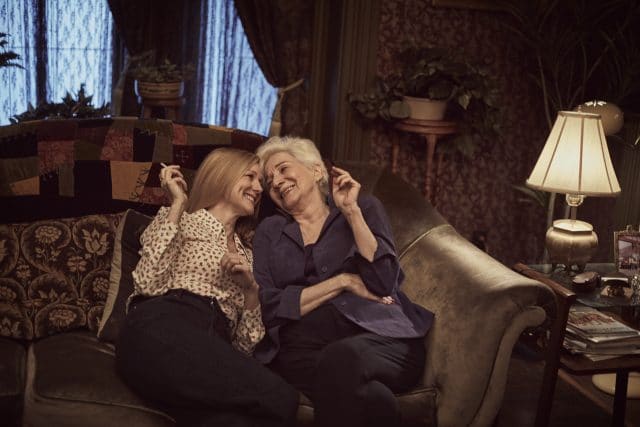
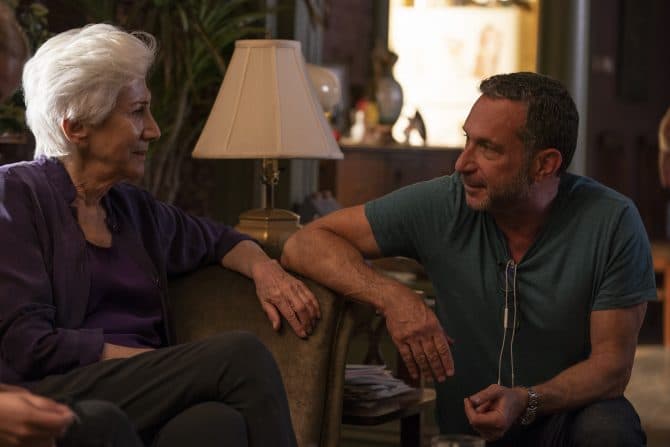 Alan Poul with Olympia Dukakis
Alan Poul with Olympia Dukakis
The seven-time Emmy nominee Alan Poul is a fearless producer.
Having worked on low budget films like Candyman through the 1980s and early 90s, Poul took on a job that would earn him distinction in the annals of television: producer of the landmark, if controversial, miniseries Tales of the City in 1993. Since then, Poul has produced other acclaimed, groundbreaking shows such as My So-Called Life, Six Feet Under, The Newsroom and Westworld.
Poul also returned to produce the Tales of the City sequels, More Tales of the City and Further Tales of the City. He resumes those duties this month when the much-anticipated Netflix revival of Tales lands on the streaming platform. The revival marks a full-circle reunion of original cast members Laura Linney, Olympia Dukakis, Barbara Garrick, and Paul Gross, as well as behind-the-scenes talents like Poul and series author Armistead Maupin.
Queerty scored a few minutes with Poul ahead of the Tales of the City premiere to chat about his career and his duty as keeper of the keys to Barbary Lane.
It was in the early ’90s. The short version: I was working, at the time, with a company called Propaganda Films, which is a seminal production company of the early 90s. We started in music videos but branched out into narrative. They were a sister organization of Working Title [production company behind Fargo, No Country For Old Men and Les Miserables] in the UK, which is still around today
Working Title had the rights to the book, and because it needed to be shot in the US, they’d asked Propaganda to carry the ball. I was the main in-house producer for narrative. They came to me not knowing that I was a huge Armistead and Tales fan, because what young gay man in the 90s wasn’t? They said, “Have you heard of this Tales of the City? Would you be interested in producing?”
So I met with Armistead, Richard Kramer who wrote the original adaptation, and that’s how it happened. It was really just great serendipity.
I’d like to take full credit, but I can’t. One of the great things that emerged from the original series for my life was my friendships with Armistead and Laura, which continue. So going back to Working Title, Andrew Stern who was running the TV department at the time, and who is one of our executive producers, discovered that Working Title still had the rights to the book. He’d be a huge fan of the original series too. So he called me and said, “Would you be interested in doing this again?” And I immediately felt that the time was really right given where we are now as a culture, in terms of two different angles.
One is how we have changed and diversified with the passing of the generations: an entirely new iteration of queerness and sexual fluidity. And then the second being the state of our nation, and the world, where the all-embracing message of Armistead’s world, I felt, this would be an ideal time to re-inject that into the public conversation. So I called Armistead, and he was aboard. And I called Laura, and she was immediately on board. We weren’t sure how to go about doing a new chapter, it was revisiting an earlier chapter or a new one. Once we knew Laura was on board—the one and only Mary Ann—Mary Ann is middle aged. Laura is middle aged. Let’s just do it today and move on into the future. So that’s how the premise of the current iteration came together. After that, it was just a question of putting together the creative team.
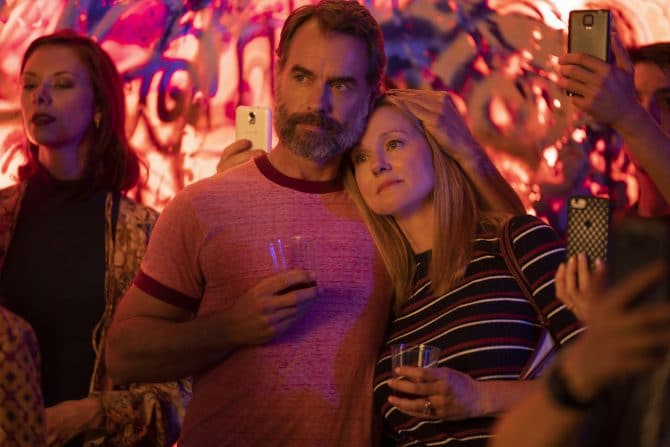 Murray Bartlett and Laura Linney
Murray Bartlett and Laura Linney
The next big turning point was Lauren coming onto the project. She incredibly aware of and respectful of Armistead’s world, his style, and the entire Tales canon, but at the same time, being part of the younger generation who was determined to tell the new generation’s stories with authenticity. So that was the key element in the creative team. We put together an all-queer writer’s room that we made sure spanned several generations so we could honor the world from which these stories sprang, while also pushing them forward to address everything that’s happening right now and present a generation of young characters that would be as revelatory and comforting to young queer people today as it was for me, an older gay man, to see myself on screen in the original Tales.
That was fairly early on. We wanted to springboard off of the later books but we had to create stories that were more immediate for the younger generation. I love the books—but the focus of the final three books is really on the older characters settling into middle age or old age. There’s a beautiful elegiac feeling to those books, but we needed to expand the world of the younger people, and make them as much of a focus as returning characters.
You know, episode eight was very personal for me.
Yeah, and I directed that. Having had the chance to work with Jen Richards and Daniela Vega to create a world and a situation for what it was like for trans women in that era which has never been shown was a great thrill. We broke ground there in a very original way.
It’s the first time she has acted in English, yes.
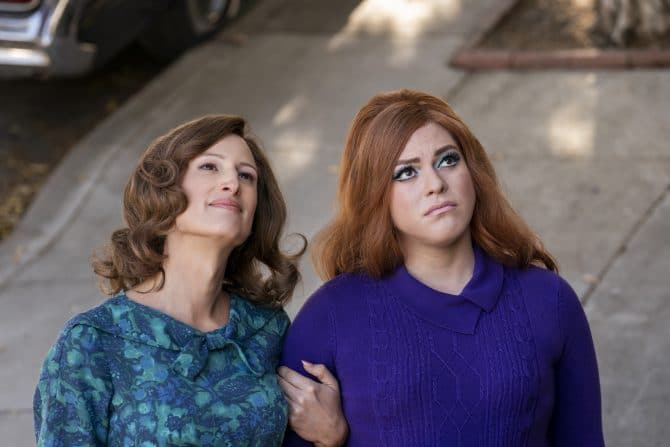 Jen Richards & Daniela Vega
Jen Richards & Daniela Vega
Also—and this was something Armistead was really, whole-heartedly on board with—as well as making the show reflect the reality of present-day San Francisco with all its diversity. And that means diversity of ethnicity, and age, and specifically gender.
I was there too. And even when the original Tales was published he came into criticism. As far back as the 70s. So Armistead has been very eager to diversify the population of Barbary Lane as much as possible.
No. But the controversy, and the extent that it got traction in the media was because of some very obnoxious noise making on the religious right, specifically Donald Wildman and the American Family Association. The show was a gigantic rating hit for PBS. It set records for PBS original dramas. So there was no question that the controversy was all ginned up. It took us by surprise because we thought we were making a love letter to San Francisco. And by the way, it’s also worth noting that the original series was made by Channel 4 in the UK, along with PBS. When it aired in the UK there was no controversy at all. It’s very telling.
So there was no damage done to me, as anybody who was going to be in the position to collaborate with me or offer me future employment—they appreciated and loved the series. Where we got caught in the political crosshairs was the fact that PBS uses public funds. It was at a time when the Republicans in Congress were gunning for the National Endowment of the Arts, with this mantra that public money shouldn’t be spent on unwholesome art. There was some movement among some members of the House of Representatives about pulling back funding for the Corporation for Public Broadcasting. So because of that, there was a new head of the CPB who then backed down and reneged on the promise PBS had made to finance the second series. That’s because of the noise the religious right made, and it took us three years to find a new home at Showtime. But that didn’t hurt me personally.
My guiding motive is to make stories that I love. So I tend to love stories that have complicated and fallible characters. I’m still very committed to telling queer stories, but at the time I started on Tales of the City, there were a dearth of images—certainly positive images—where people my age could see images of themselves reflected in a non-judgmental and interesting way from the point of view of a character. In part, because I did Tales, was in a position to do that. And I’ve also been a part of shows that aren’t very queer at all, like The Newsroom.
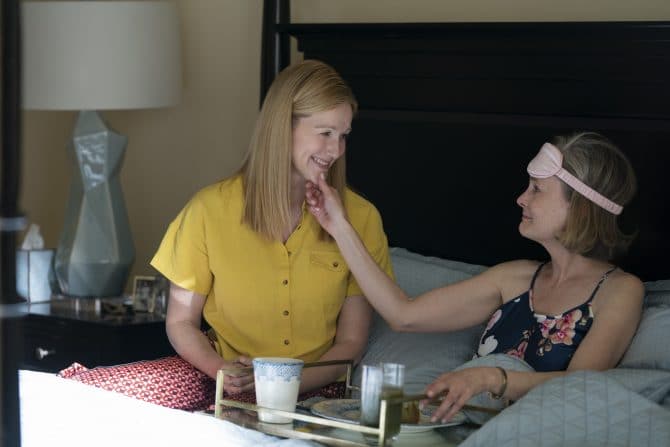 Laura Linney & Barbara Garrick
Laura Linney & Barbara Garrick
It’s so hard to make a show or a film. What people don’t often recognize is that it takes just as much effort to make a bad show as a good show. Either way, it’s going to kill you…
[Laughter]
So you better make sure it’s something you really believe in.
I mean, I hesitate to use a broad brush, and I haven’t worked on network shows for a couple of years. But I think that—because this isn’t just television, this has always been a huge bone with the MPAA for movies as well—you can chop off as many heads as you want but if you show a penis, it’s an R-rating. I think it comes from a certain prudishness in the American DNA. In addition, that kind of censorship doesn’t happen in a vacuum. It happens because of response to public opinion, or in the case of networks, an anticipated response by advertisers who are trying to sell commodities to the public. So it’s the segment of the American public most likely to get upset about sexual depiction. That segment of the public is much less concerned with depictions of violence. I’m not going to extrapolate more from that, but I think you get what I’m saying.
So everything comes down to public opinion that affects what a network will want to show.
This is a big thing for me: I really believe in trying to depict sex in a casual way. All of those things are part of our daily lives. But in terms of depiction, or what directors will be tempted to do, that’s exactly the same for sex and violence. Film is innately a sensational medium. From the time of the silent pictures pushing sensations is one thing that film has always done. So the natural tendency to sensationalize sex and violence is as old as the medium.
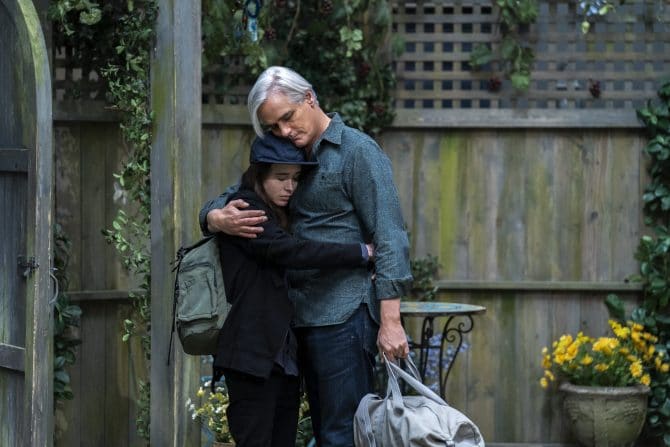 Ellen Page and Paul Gross
Ellen Page and Paul Gross
The first big emotional trigger was walking onto the set. The set, of course, went up in stages, but there was a certain point where the facade was on the house and the gate was on the fence, and the path was there, and the stairs were on the side of the house. But there was a certain point where the gate was open and you could walk through the gate and see the house. That drove it home in a visceral, emotional way.
Oh boy…
[Laughter]
That’s a really hard question. I’m not a big St. Peter at the gate guy.
But in terms of what you’re driving at—it’s the issue of legacy. Then yes, I think more than anything, Tales is my legacy. Particularly, the opportunity to come back 25 years later, and pick up something that you buried 25 years before, is just something that doesn’t happen in a lifetime. It doesn’t happen. You can’t make it happen. But in this case, it happened, and I feel incredibly blessed by that. That gives it a significance that overshadows anything else.
We’re all very committed to this as a limited series. But if there is demand, there’s always a way to figure it out. But right now we’re just at a place where we’re really satisfied that we made this happen.
Tales of the City streams on Netflix June 7.







